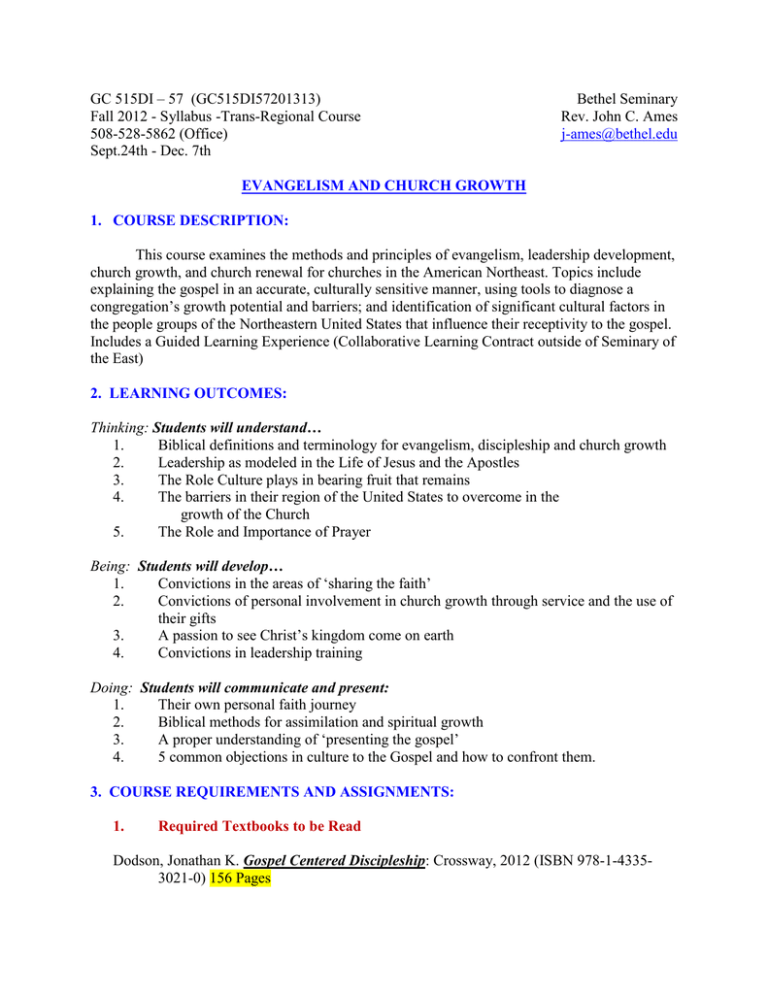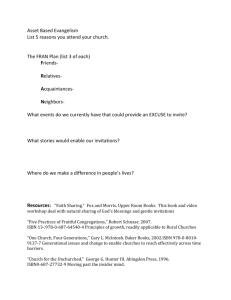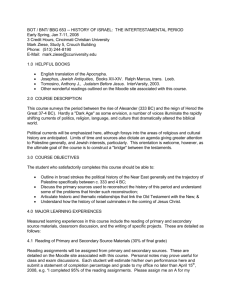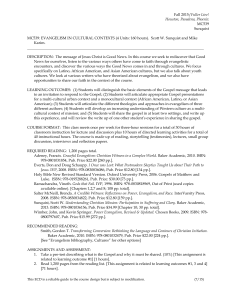GC515: 2012 Fall , Ames, Evangelism and Church Growth (TR)
advertisement

GC 515DI – 57 (GC515DI57201313) Fall 2012 - Syllabus -Trans-Regional Course 508-528-5862 (Office) Sept.24th - Dec. 7th Bethel Seminary Rev. John C. Ames j-ames@bethel.edu EVANGELISM AND CHURCH GROWTH 1. COURSE DESCRIPTION: This course examines the methods and principles of evangelism, leadership development, church growth, and church renewal for churches in the American Northeast. Topics include explaining the gospel in an accurate, culturally sensitive manner, using tools to diagnose a congregation’s growth potential and barriers; and identification of significant cultural factors in the people groups of the Northeastern United States that influence their receptivity to the gospel. Includes a Guided Learning Experience (Collaborative Learning Contract outside of Seminary of the East) 2. LEARNING OUTCOMES: Thinking: Students will understand… 1. Biblical definitions and terminology for evangelism, discipleship and church growth 2. Leadership as modeled in the Life of Jesus and the Apostles 3. The Role Culture plays in bearing fruit that remains 4. The barriers in their region of the United States to overcome in the growth of the Church 5. The Role and Importance of Prayer Being: Students will develop… 1. Convictions in the areas of ‘sharing the faith’ 2. Convictions of personal involvement in church growth through service and the use of their gifts 3. A passion to see Christ’s kingdom come on earth 4. Convictions in leadership training Doing: Students will communicate and present: 1. Their own personal faith journey 2. Biblical methods for assimilation and spiritual growth 3. A proper understanding of ‘presenting the gospel’ 4. 5 common objections in culture to the Gospel and how to confront them. 3. COURSE REQUIREMENTS AND ASSIGNMENTS: 1. Required Textbooks to be Read Dodson, Jonathan K. Gospel Centered Discipleship: Crossway, 2012 (ISBN 978-1-43353021-0) 156 Pages Hawkins, Greg L. MOVE - What 1,000 Churches Reveal About Spiritual Growth: Zondervan; Willow Creek Association, 2011; (ISBN 978-0-310-32525-3) 286 Pages Metzger, Will. Tell the Truth; InterVarsity Press: 2002; (ISBN 0-8308-2322-0) 259 Pages Smith, Gordon T. Transforming Conversion: Baker Academic, 2010; (ISBN 978-0-80103247-9) 203 Pages Hollinghurst, Steve; Mission Shaped Evangelism; Canterbury Press, 2010 (ISBN 978-185311-842-5) 255 Pages TOTAL OF 1159 PAGES… 2. Recommended and Suggested Reading Coleman, Robert E. The Master Plan of Evangelism. Baker, 1994. ISBN: 0-800-786246 Hirsch, Alan. The Forgotten Ways: Brazos Press, 2006. ISBN 1-58743-164-5 Hybells, Bill. The Volunteer Revolution. Grand Rapids. Zondervan, 2004 25238-5 ISBN: 0-310- Kinnaman, David and Gabe Lyons. Unchristian. Grand Rapids. Baker Books, 2007 ISBN: 978-0-08010-1300-3 McNeil, Reggie. The Present Future: Six Tough Questions for the Church; San Francisco. Jossey-Bass, 2003. ISBN:0-7879-6568-5 Mittleberg, Mark. The Questions Christians Hope No One Will Ask. Tyndale, 2010 ISBN 978-1-4143-1591-1 3. ASSIGNMENTS a. Attendance: Expected for all online discussion and active participation in Moodle. I want to be able to see that you are active in discussions with your peers. This does not mean that you must respond to all postings. b. All readings are to be completed on time according to class schedule. c. “Your Witness” – Spiritual Journey Posting to Moodle in the first week. This will allow others to get to know you in class and help you put into words your story. d. A short reaction paper to Gospel-Centered Discipleship - Agree or Disagree - to be posted on Moodle. e. Learn a gospel presentation and role play with another student or friend. Role plays are not ‘real’ we all understand, but they are helpful. Post a one page write up on Moodle of your experience and the challenges you faced. 1. Identify the presentation (Roman Road, Steps to Peace with God…) 2. Explain the situation of the role play 3. Explain how you felt in the sharing experience 4. What was it like to close the presentation? 5. What questions seemed to be easy/difficult to deal with? f. Two book review assignments are required according to the dates specified on the class schedule (1500 words). Thoughtful reflection is expected and not just a summary of the content. I’m looking to hear from you “what you learned” from your reading time and what you may ‘agree or disagree’ with. This should include footnoted citations from the books. These will be turned into the professor electronically. These will not to be posted in the Moodle program. g. Reading Assignment Questions: Each student will respond to 2 professor discussion questions posted on Moodle (PDQ’s) from two required book readings (400 Words each). The class will be divided into two discussion groups. Students will also be required to respond to one other student’s posting of each reading assignment question within the discussion group on Moodle. This will mean a total of four postings by each student. (One response to each of the two professor questions; One response to each of the two student postings of the two questions) h. Term Paper of not more than 8 pages (excluding bibliography and cover page double spaced) on “How the Christian Church Grows” Footnotes are expected. This should include: i. A biblical Foundation of Evangelism, Discipleship and Church Growth a. Must include OT and NT references ii. The Relationship between ‘conversion growth, biological growth and transfer growth’. The Value of Each. iii. The Role of Volunteers in Church Growth iv. Leadership Development and Gifts Following this format is required. Adding beyond this and developing other topics is fine but the above topics MUST be included. i. Guided Learning Experience i. Each Student will submit a ‘GLE’ report at the end of the course. Those outside of Seminary of the East will submit a similar ‘CLC’ report; (Collaborative Learning Contract). This is a ‘hands-on’ assignment which requires experiencing a learning project during the course and an evaluative write-up afterward. Seminary of the East students, please check your manuals on GLE requirements. Other students can refer to the posted guidelines in the Moodle program for the course on CLC’s. You will find some suggestions at the end of the syllabus for this project. Contracts are to be submitted by the second week for approval. 4. COURSE SCHEDULE Course schedule is below with suggested preparation outline and assignment deadlines. Please note: You have your spiritual journey paper due BY THE END OF WEEK ONE. EACH ASSIGNMENT IS DUE BY THE END OF THE WEEK (SUNDAY NIGHT) Sessions Suggested Preparation Assignment DUE______ Week One 9/24-9/30 Read Dodson Your Witness – Posting Choose GLE/CLC project Post on Moodle – Your Witness Spiritual Journey Week Two 10/1-10/7 Meet with Mentor or Advisor; Write Contract Finish Dodson Submit GLE Contract Week Three 10/8-10/14 Read Tell the Truth Post - one page reaction to Gospel Centered Discipleship Week Four 10/15-10/21 Finish Metzger Write Review Submit - Tell the Truth Book Review Week Five 10/22-10/28 Gospel Role Play Post – Evaluation of Role Play Week Six 10/29-11/4 Reading and Research Week GLE/CLC Start Reading Move No Assignments Due Week Seven 11/5-11/11 Finish Reading Move Write Review Submit MOVE Book Review Week Eight 11/12-11/18 Read Transforming Conversion Post PDQ #1 Week Nine 11/19-11/25 Read Mission Shaped Evangelism Post PDQ #2 Week Ten 11/26-12/2 Work on GLE and Term Paper Post Student Responses to PDQ #1,#2 Week Eleven 12/3-12/7 5. Finalize Paper Write GLE/CLC Integrative Report Submit GLE and Term Paper CONTACT TIME WITH PROFESSOR This is a fully distant learning course online of 40 hours. It is expected that the reading time, online supervised discussions, Moodle responses and the preparation and execution of papers along with the GLE/CLC assignments will be equivalent to the 40 hours. Hence, classroom time will be replaced by your work online and offline. The professor will have contact time with students during the online discussions and online seminar times. He can be reached through the office number at the beginning of the syllabus or through EMAIL correspondence. PowerPoint presentations and notes by the professor on the content for weekly sessions will be available for download in preparation for the term paper. 6. GRADING Letter grades will be given at the end of the course based on levels of performance and criteria established for each assignment. A= Outstanding work submitted and clear demonstration of use of resources in assignments displaying thorough knowledge of material covered. Active participation in class and consistent evidence is shown of creative and original thinking. B= High Quality work submitted and good demonstration of use of resources in assignments with a display of above average knowledge of material covered. Participation in class is shown with respect of other students. C= Average and satisfactory work submitted with limited use of resources in assignments displayed. Some knowledge of material is reflected in assignments. Sporadic participation in class is shown and respectful interaction is displayed. D= Poor work submitted with little evidence of ability to analyze and synthesize class material. Inconsistent class attendance and very little effort shown for improvement. F= Inadequate work submitted with insufficient evidence of knowledge of course material. Poor participation in class and a failure to complete class and course assignments. No effort made to improve and sporadic attendance in class. Please note that a grade of “C” represents satisfactory performance, and that students are required to hold a cumulative grade point average of 2.0 or higher (C average) to graduate with a degree from Bethel. Final Grade calculations for the course will be as follows: 1. 2. 3. 4. 5. 6. 7. ‘Your Witness’ Assignment Reaction Paper to Gospel Centered Discipleship Gospel Presentation Role Play Two book review papers (1500 words) Moodle postings to Professor Discussion Questions (PDQ’s) Term paper ‘How the Christian Church Grows’ GLE/CLC Contract and Integrative Report (5% of grade) (5% of grade) (5% of grade) (20% of grade) (20% of grade) (25% of grade) (20% of grade) 7. INCOMPLETE POLICY: There will be no extensions for work in this class except for extenuating circumstances, family emergencies, or medical reasons. In such cases a “Course Work Petition” form must be completed by the student, signed by the Course Professor, and returned to the Center Director prior to the conclusion of the last day of class. The final approval for petitions is granted by the Academic Programs Assessment and Accreditation Committee. (see the “Incomplete Policy” in The Student Handbook for further details). 8. ACADEMIC COURSE POLICIES: Please familiarize yourself with the catalog requirements as specified in Academic Course Policies document found on the Registrar's website at: https://bethelnet.bethel.edu/ureg/bssp/acp/. You are responsible for this information, and any academic violations, such as plagiarism, will not be tolerated. 9. INTEGRATIVE PORTFOLIO: This assignment has been identified as a required integrative assignment that you may wish to review and reference in future integrative coursework. 10. COURSE EVALUATIONS: Student course assessments are an important part of course development and enhancement. In order to recognize the value of your input and to encourage you to provide that input, completing the course evaluation at the end of this course is included as a component of class participation. While your responses are anonymous, failure to submit an electronic evaluation will reduce your course grade by 2%. For any questions regarding the course evaluation process, please go to https://bethelnet.bethel.edu/ureg/bssp/eval_index. 11. DISABILITIES: Any student, who because of a disability may require some special arrangements to meet course requirements, should contact the instructor or the Access Coordinator for the Bethel Office of Disability Services as soon as possible to discuss reasonable accommodations. Please see the Student Handbook. 12. GUIDED LEARNING EXPERIENCE Learning Outcome: In consultation with the course Professor and mentors, create a guided learning experience that develops new skills, enhances your current skills and gifts in ministry, and provides a concrete learning vehicle for the immediate and practical application of the course material to your ministry context. Learning Contract: In consultation with the Course Professor and your mentors, you are required to design a ministry skills learning contract. This contract will develop new skills in the areas of corporate evangelism and/or Church Growth, enhance current skills, and apply the course concepts in a specific and growth producing manner. The learning contract must relate to the course and to the integration and application of the course material to your ministry context. You are expected to cover the required components in your learning contract (scriptural, cognitive, experiential, interactive and reflective) and develop graduate level learning tasks that satisfy each of the components. Your guided learning experience will be evaluated and graded according to the satisfactory fulfillment of the tasks you contract to do, demonstrated learning, its evaluation by your mentors and the Course Professor, and the timely completion and submission of your contract (Second or third week sent electronically or by hard copy) and the completed Integrative Learning Report (due the last day of class). Guided Learning Experience and Contract (GLE) – Collaborative Learning Experience and Contract (CLC) Suggestions: 1. Do a survey or questionnaire of a certain populous asking what are their major objections (5-10) to Christianity and/or Christians. Compile the data and formulate clear biblical responses to how you might dialogue with someone about these objections. 2. Come up with a list of characteristics of your region of the United States that would set you apart from other regions culturally. Then seek to develop a strategy that would bridge build and connect with your region for a gospel witness. 3. Work with your pastor to develop an evangelism strategy for equipping and training members and interested Christians in your congregation on how to share their faith. 4. Develop a seminar for your church on how to assimilate new people into your church. 5. Organize an evangelistic event that touches the cultural needs of your area. 6. Develop and hold a seminar, conference on equipping believers to tell their story in an effective way (Testimony)




